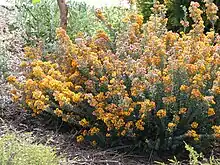| Oxylobium | |
|---|---|
 | |
| Oxylobium ellipticum | |
| Scientific classification | |
| Kingdom: | Plantae |
| Clade: | Tracheophytes |
| Clade: | Angiosperms |
| Clade: | Eudicots |
| Clade: | Rosids |
| Order: | Fabales |
| Family: | Fabaceae |
| Subfamily: | Faboideae |
| Clade: | Mirbelioids |
| Genus: | Oxylobium Andrews[1] |
| Species | |
|
See text | |
Oxylobium, commonly known as shaggy-pea,[2] is a genus of flowering plants in the family Fabaceae all of which are endemic to Australia.
Description
Oxylobium range in size from prostrate to short, upright shrubs, mostly with simple, hairy stems especially when young. The leaves are mostly opposite or whorled, occasionally alternate. The pea-flowers yellow, orange or yellow-red, borne in leaf axils or at the end of branches. Flowering usually occurs in spring.
Taxonomy
The genus Oxylobium was first formally described by Henry Cranke Andrews in 1807, the description was published in The Botanist's Repository for New, and Rare Plants and the type specimen was Oxylobium cordifolium.[3][4]
Species
The following is a list of species of Oxylobium accepted by the Australian Plant Census:
- Oxylobium arborescens R.Br.—tall shaggy pea
- Oxylobium cordifolium Andrews
- Oxylobium ellipticum (Vent.) R.Br.—common shaggy pea, golden shaggy pea
- Oxylobium pulteneae DC.—wiry shaggy pea
- Oxylobium robustum J.Thompson
References
- ↑ "Oxylobium". Australian Plant Census. Retrieved 28 November 2020.
- ↑ Wiecek, B. "Oxylobium". PlantNET-NSW Flora online. Royal Botanic Gardens Sydney. Retrieved 28 November 2020.
- ↑ "Oxylobium". Australian Plant Name Index. Retrieved 29 November 2020.
- ↑ Andrews, Henry C. (1807). The Botanists Repository for New, and Rare Plants. p. 492.